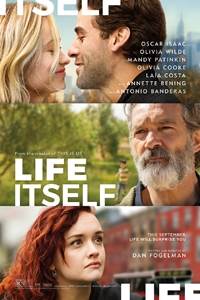Life Itself
Written and Directed by Dan Fogelman
Starring Oscar Isaac, Olivia Wilde, Mandy Patinkin, Olivia Cooke, Laia Costa, Annette Bening, Antonio Banderas
Life has a funny way of finding connections when we least expect it. We never look for said connections and they are so random that unless we’re aware of every single moment that happens in our lives, we will pass unaware of said connection.
This is why I’m having difficulty accepting the messy connections formed in Dan Fogelman’s “Life Itself.” The real-world scenarios presented in each of our character’s lives are so disparately connected that they border incredulity. Almost.
Why “almost,” Ben?
It is because of the way Fogelman starts his story. Any film with a dramatic-action voice over by Samuel L. Jackson is looking to make an emphatic entrance. Perhaps it’s the intent of the scene, and the drama that unfolds not only in front of our eyes, but in front of Will’s (Oscar Isaac) eyes.
Will is aflutter with his wife, Abby (Olivia Wilde). They have the type of relationship that exists in fairy tales, when she is tragically struck down. Will is so stricken with grief that he goes mental. And this is where we find ourselves: his road to recovery. Annette Bening plays his psychiatrist, Dr. Cait Morris who tries to help him recover.
Through flashbacks, Fogelman explores Abby and Will’s relationship as well as the birth of their daughter, Dylan (Olivia Cooke) who is a tormented soul looking for her place in the universe. The same day as the tragedy affected Will and Abby, Rodrigo witnesses the accident and his life in Spain is never the same.
In a parallel story, Fogelman takes us back to what brought Rodrigo to that point, growing up with his loving parents Javier and Elena as tragedy strikes their family. Through the support of a wealthy landowner, Mr Saccione (Antonio Banderas), they are able to get Rodrigo the help he needs, eventually reconnecting him with his past.
I don’t find the intersecting lives bit paradoxical in the slightest. As I stated at the beginning of this review, we never know when our lives will have touched one another. The trouble that I’m having is that the story starts out with such a dramatic bang that by the time we get to the end, we’re so emotionally exhausted from all the to’s and fro’s of each characters part in the story that we have to ask ourselves, “why was this journey so important?”
The more compelling tragedy is that the storytelling is so disjointed that the characters ultimately didn’t matter. Just as with David Frankel’s “Collateral Beauty,” it wasn’t so much that we were watching the character’s reactions to the tragedies that befell them, but we were witnessing events. Where “Collateral Beauty” was a bit more successful because its timeline didn’t veer too wildly like Fogelman’s did, Fogelman’s characters are admittedly stronger, which should make their journey’s more compelling.
Perhaps that is Fogelman’s point.
While we never know the impact we will have on someone else’s life, life itself brings us together, conveniently packaged in a two-hour film.
1.75 out of 4










